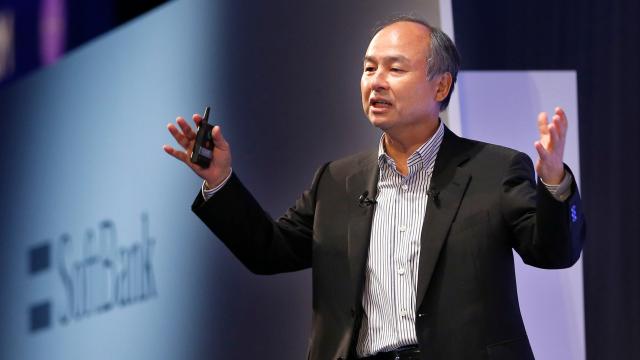If you read a lot of tech news, the mind wanders every so often to billionaire SoftBank CEO Masayoshi Son. Is he sitting at his desk, the blackened banana peel of a detonated booby cigar still dangling from his lips, since SoftBank’s multi-billion-dollar gamble on WeWork spectacularly blew up in his face? Or is he gleefully refreshing today’s news that Nuro’s passenger-less vehicle may actually birth the glorious pizza-delivering unicorn one hopes? Is he ok or what?
According to the Wall Street Journal today, the answer is likely a no.
Since 2016, SoftBank’s $US100 ($150) billion Vision Fund has hurled colossal sums of money at tech start-ups like WeWork, Uber, DoorDash, Slack, and also a robotic pizza startup Zume (running list here). The theme in many of these companies, the New York Times has noted, is that they gather our data; not a bad bet, financially, but they possibly didn’t consider whether anybody actually wanted to use the companies’ services or whether the CEOs were absolute maniacs. Now, sources told the Journal that SoftBank may only raise about half of its anticipated target of $US108 ($162) billion for Vision Fund II, and much of it is expected to come from SoftBank itself rather than outside investors. The Journal’s behind-the-scenes tale is Silicon Valley lore: hubris, failure, infighting, cutbacks.
“The fund was run unlike almost any other of its size,” the Journal reports. “Billion-dollar investment decisions were made in minutes rather than by committees after months of research. The fund was beset by turf battles and described by an outside consultant as ‘chaotic’ and ‘personality driven.’”
This is code for a rash investor who likes to make it raaaaain. In 2017, for example, the New York Times reported that Son invested $US164 ($246) million in Mapbox without so much as hearing out a pitch.
The Journal describes Son as a man who “sees himself as a tech visionary.” That is also code for a man who once declared that by 2047, the population of “smart robots” will equal that of the human population.
The paper reports that “several senior executives” have left; layoffs loom; major investors are demanding more control over how their money’s spent—namely, that it comes from profits from the first fund, which has reportedly amounted to $US10 ($15) billion.
The Financial Times reports that SoftBank shares were boosted today from news of investment from a more tempered-looking American hedge fund Elliott Management, but even that could be a problem if, say, Elliott Management would like “more transparency” and “governance changes.”
But what’s one bad year for a man with a 300-year plan and an estimated $US21.6 ($32) billion fortune?
Son aside, it sucks for workers who banked on equity inflated by pie-in-the-sky thinking that doesn’t account for people who generate SoftBank’s profits. The Journal reports that amidst the chaos, SoftBank responded by shifting the burden onto the companies in which it invested:
SoftBank began pushing companies in its portfolio to cut costs and turn a profit quickly. A number of Vision Fund portfolio companies have recently laid off staff to limit losses, including WeWork, Oyo Hotels & Homes, Uber, food-delivery company Rappi, and car-leasing company Fair.
Masayoshi Son is probably ok. But it’s still nice to imagine him shuffling through the streets, downcast, trailed by a New York Times photographer to the sound of a Stradivarius knock-off.
